Publications
A list of selected papers in which research team members participated.
For a full list see below or go to Google Scholar (Jisun An and Haewoon Kwak).
computational journalism
political science
network science
game analytics
AI/ML/NLP
HCI
online harm
dataset/tool
bias/fairness
user engagement
AI/ML/NLP
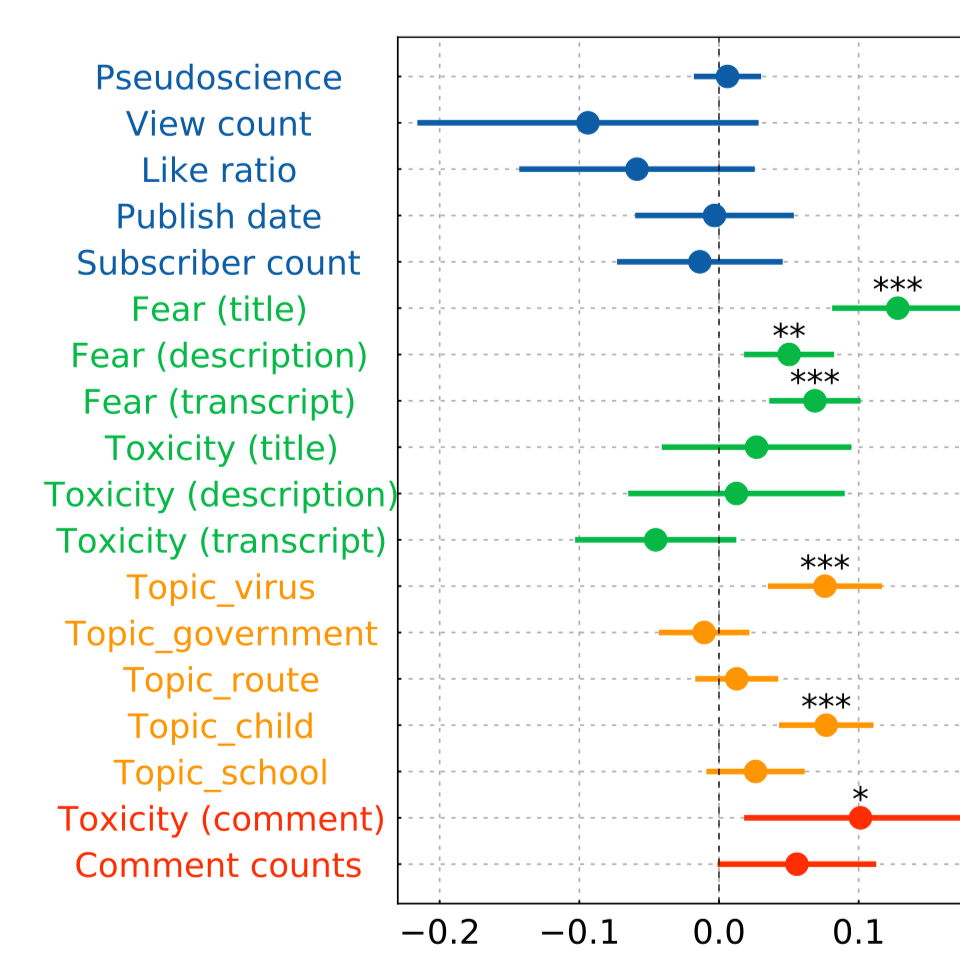
What is the true impact of toxic trolling in the comment sections of anti-vaccine YouTube videos? While it’s widely believed that such comments spread fear and fuel vaccine hesitancy, there has been little empirical evidence to measure this effect. Our latest study tackles this question by analyzing the complex interplay between toxicity and fear across 484 anti-vaccine videos and more than 414,000 of their comments. Using machine learning to score each comment, we found a significant link between the overall toxicity of a video’s comment section and the level of fear expressed within it. More importantly, we discovered a powerful contagion effect; the toxicity of highly liked early comments was significantly associated with a rise in fear in subsequent comments. This influence was also found to be bidirectional, as highly liked fearful comments were linked to an increase in later toxicity.
Kunihiro Miyazaki, Takayuki Uchiba, Haewoon Kwak, Jisun An, Kazutoshi Sasahara
AI/ML/NLP
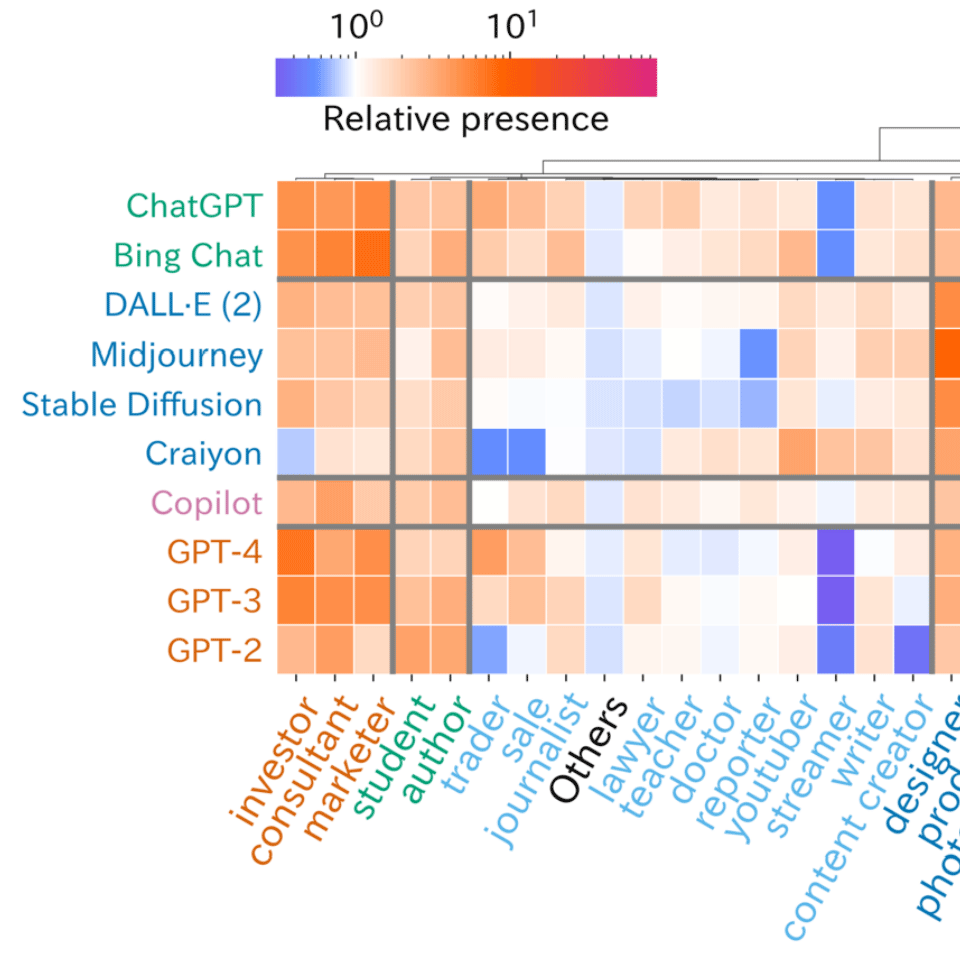
The emergence of generative AI has sparked substantial discussions, with the potential to have profound impacts on society in all aspects. As emerging technologies continue to advance, it is imperative to facilitate their proper integration into society, managing expectations and fear. This paper investigates users’ perceptions of generative AI using 3M posts on Twitter from January 2019 to March 2023, especially focusing on their occupation and usage. We find that people across various occupations, not just IT-related ones, show a strong interest in generative AI. The sentiment toward generative AI is generally positive, …
Kunihiro Miyazaki, Taichi Murayama, Takayuki Uchiba, Jisun An, Haewoon Kwak
Press coverage-Blockchain News
AI/ML/NLP
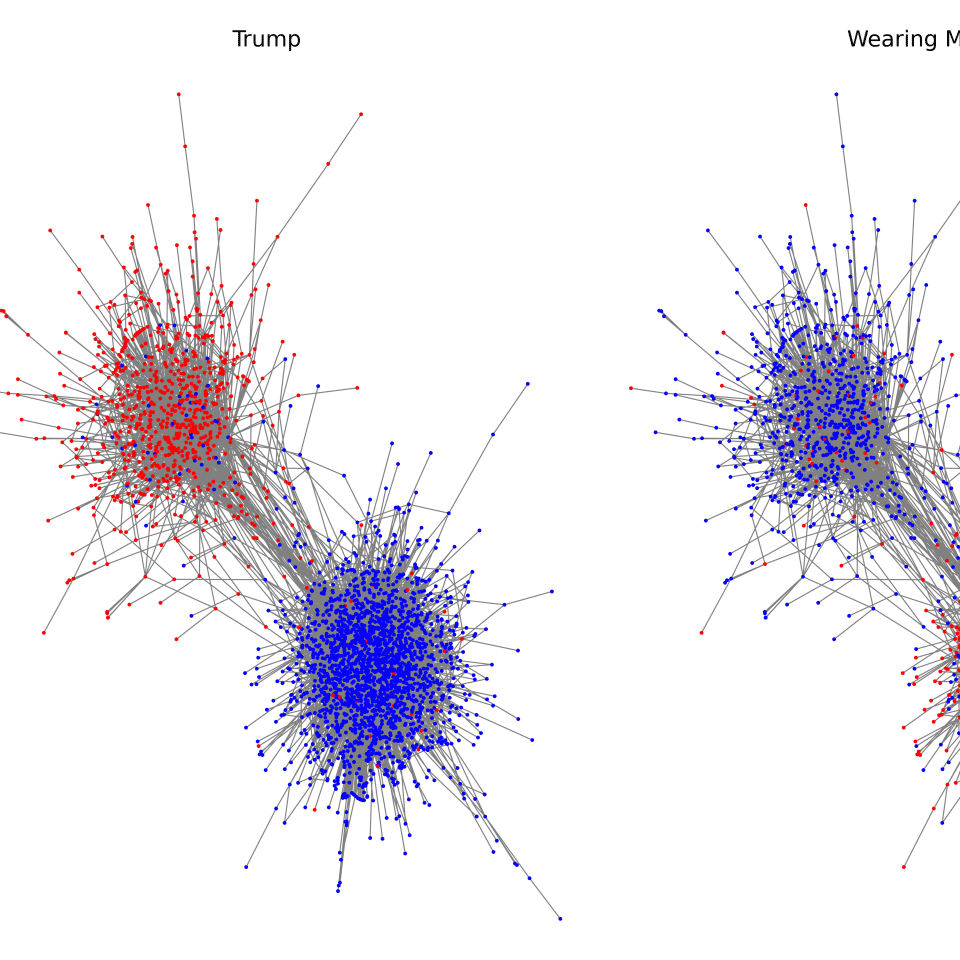
People who share similar opinions towards controversial topics could form an echo chamber and may share similar political views toward other topics as well. The existence of such connections, which we call connected behavior, gives researchers a unique opportunity to predict how one would behave for a future event given their past behaviors. In this work, we propose a framework to conduct connected behavior analysis. Neural stance detection models are trained on Twitter data collected on three seemingly independent topics, i.e., wearing a mask, racial equality, and Trump, to detect people’s stance, …
Hong Zhang, Haewoon Kwak, Wei Gao, Jisun An
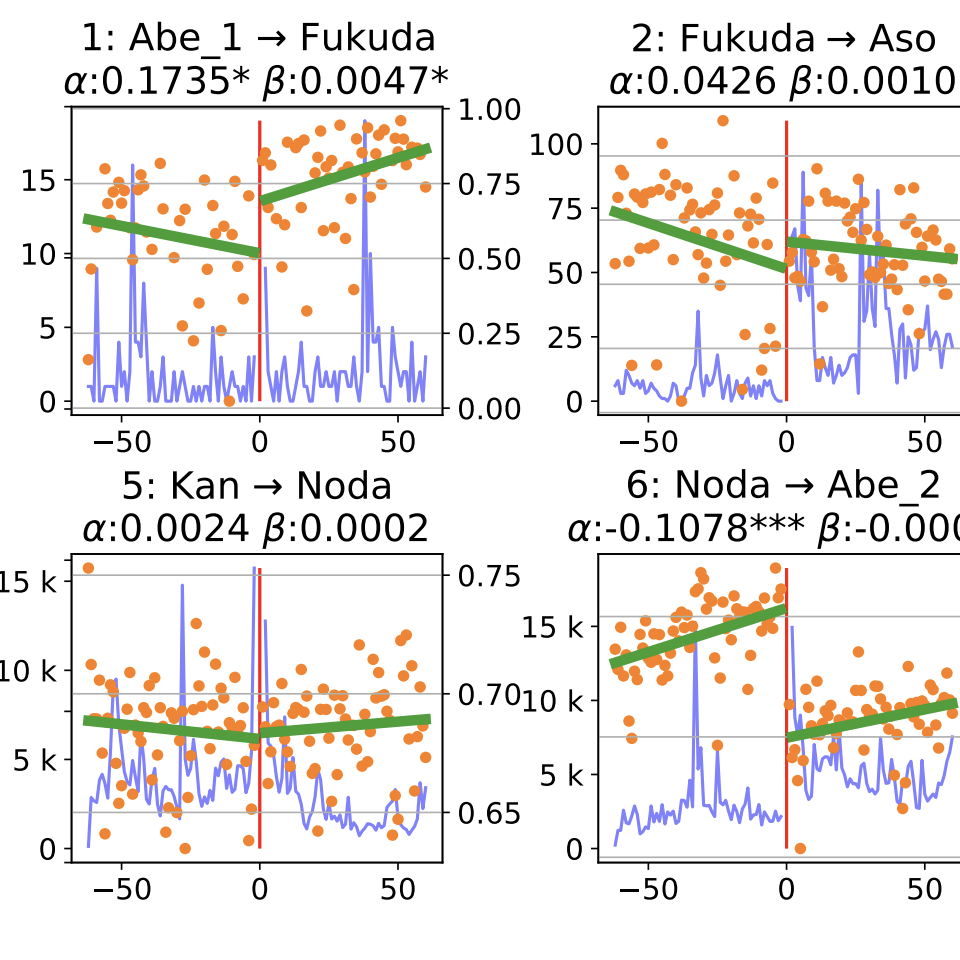
New leaders in democratic countries typically enjoy high approval ratings immediately after taking office. This phenomenon is called the honeymoon effect and is regarded as a significant political phenomenon; however, its mechanism remains underexplored. Therefore, this study examines how social media users respond to changes in political leadership in order to better understand the honeymoon effect in politics. In particular, we constructed a 15-year Twitter dataset on eight change timings of Japanese prime ministers consisting of 6.6M tweets and analyzed them in terms of sentiments, topics, and users. …
Kunihiro Miyazaki, Taichi Murayama, Akira Matsui, Masaru Nishikawa, Takayuki Uchiba, Haewoon Kwak, Jisun An
computational journalism online harm
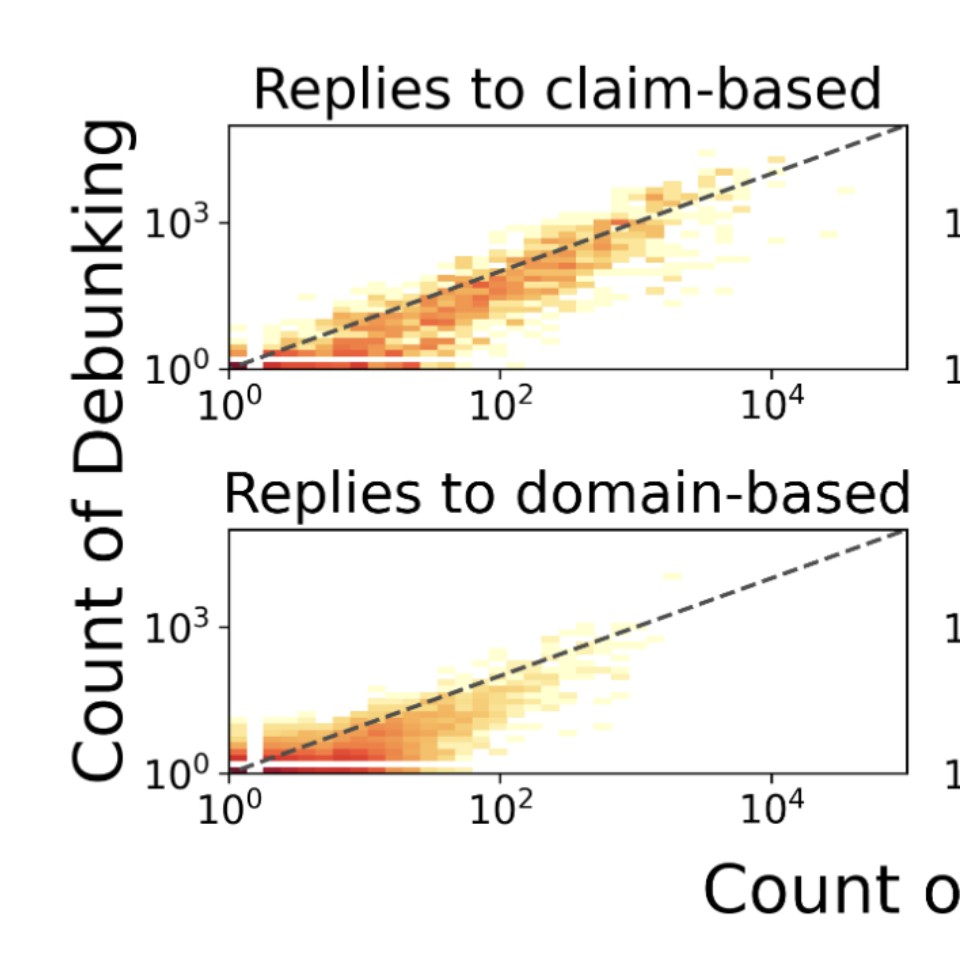
False information spreads on social media, and fact-checkingis a potential countermeasure. However, there is a severeshortage of fact-checkers; an efficient way to scale fact-checking is desperately needed, especially in pandemics likeCOVID-19. In this study, we focus on spontaneous debunk-ing by social media users, which has been missed in exist-ing research despite its indicated usefulness for fact-checkingand countering false information. Specifically, we character-ize the tweets with false information, or fake tweets, thattend to be debunked and Twitter users who often debunk faketweets.
Kunihiro Miyazaki, Takayuki Uchiba, Kenji Tanaka, Jisun An, Haewoon Kwak, Kazutoshi Sasahara
network science
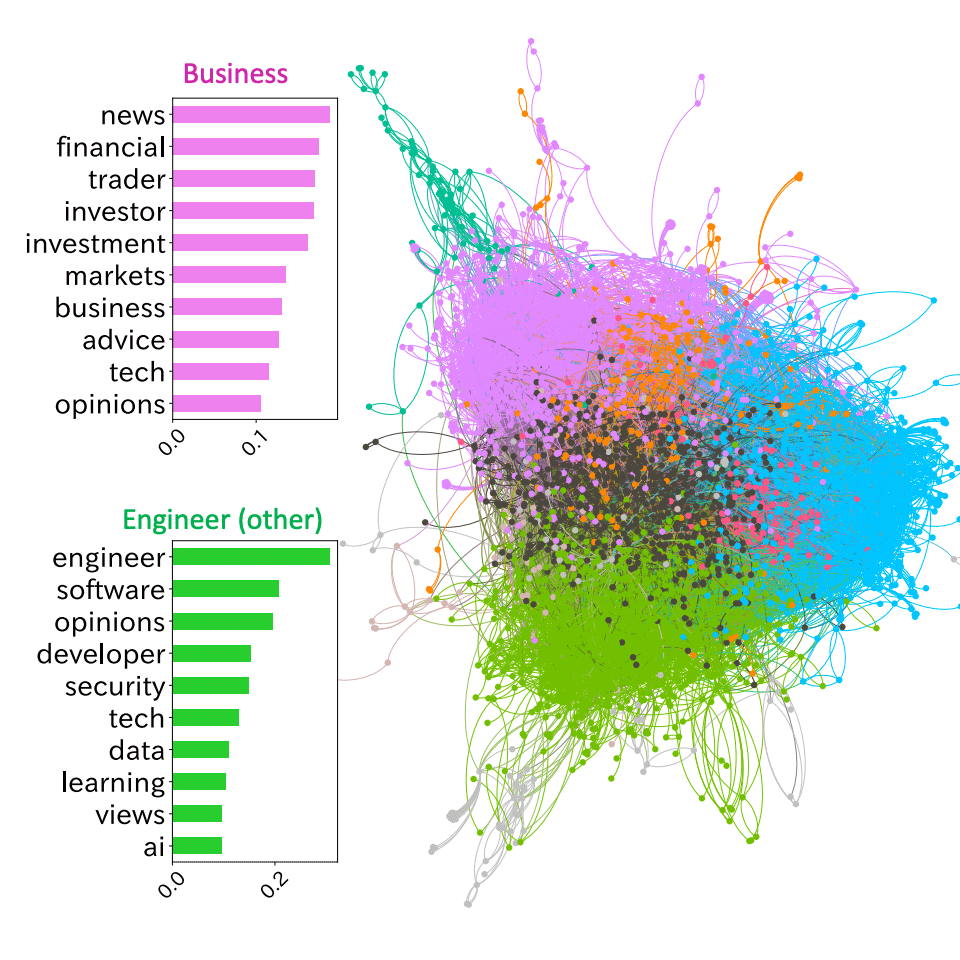
Social media is not only a place for people to communicate on a daily matter but also a virtual venue to transmit and exchange various ideas. Such ideas are known as the raw voices of potential consumers, which come from a wide range of people who may not participate in consumer surveys, and therefore their opinions may contain high value to companies. However, how users share their ideas on social media is still underexplored. This study investigates a spontaneous ideation contest about a generic term for new Big Tech companies, which occurred when Facebook changed its name to Meta. We constructed a comprehensive dataset of tweets containing candidates and examined how they were suggested, spread, and exchanged by social media users. Our findings indicate that different ideas are better on different metrics. The ranking of ideas was not decided immediately after the idea contest started. The first people to post ideas have smaller followers than those who post secondarily or who only share the idea. We also confirmed that replies accumulate unique ideas, but most of them are added in the first depth in reply trees. This study would promote the use of social media as a part of open innovation and co-creation processes in the industry.
Kunihiro Miyazaki, Takayuki Uchiba, Haewoon Kwak, Jisun An
political science network science
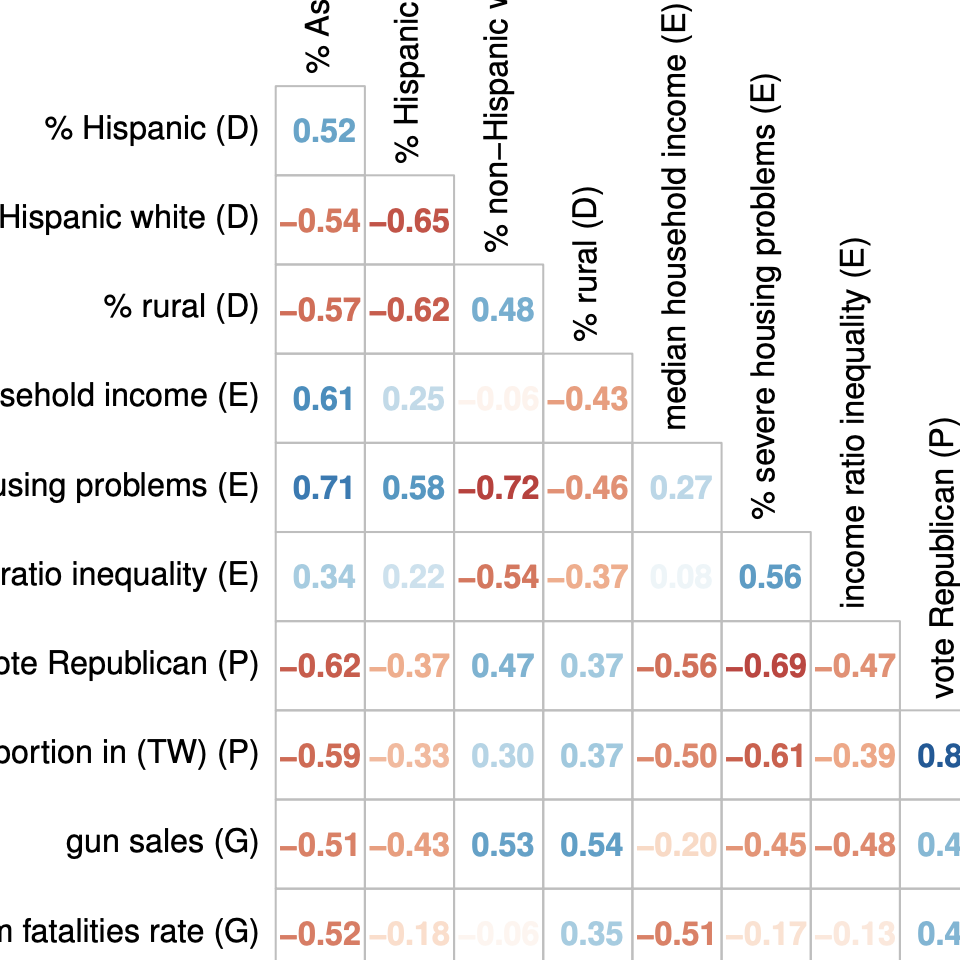
The United States have some of the highest rates of gun violence among developed countries. Yet, there is a disagreement about the extent to which firearms should be regulated. In this study, we employ social media signals to examine the predictors of offline political activism, at both population and individual level. We show that it is possible to classify the stance of users on the gun issue, especially accurately when network information is available. Alongside socioeconomic variables, network information such as the relative size of the two sides of the debate is also predictive of state-level gun policy. On individual level, we build a statistical model using network, content, and psycho-linguistic features that predicts real-life political action, and explore the most predictive linguistic features. Thus, we argue that, alongside demographics and socioeconomic indicators, social media provides useful signals in the holistic modeling of political engagement around the gun debate.
Yelena Mejova, Jisun An, Gianmarco De Francisci Morales, Haewoon Kwak
ACM Transactions on Social Computing, 2022
AI/ML/NLP political science online harm
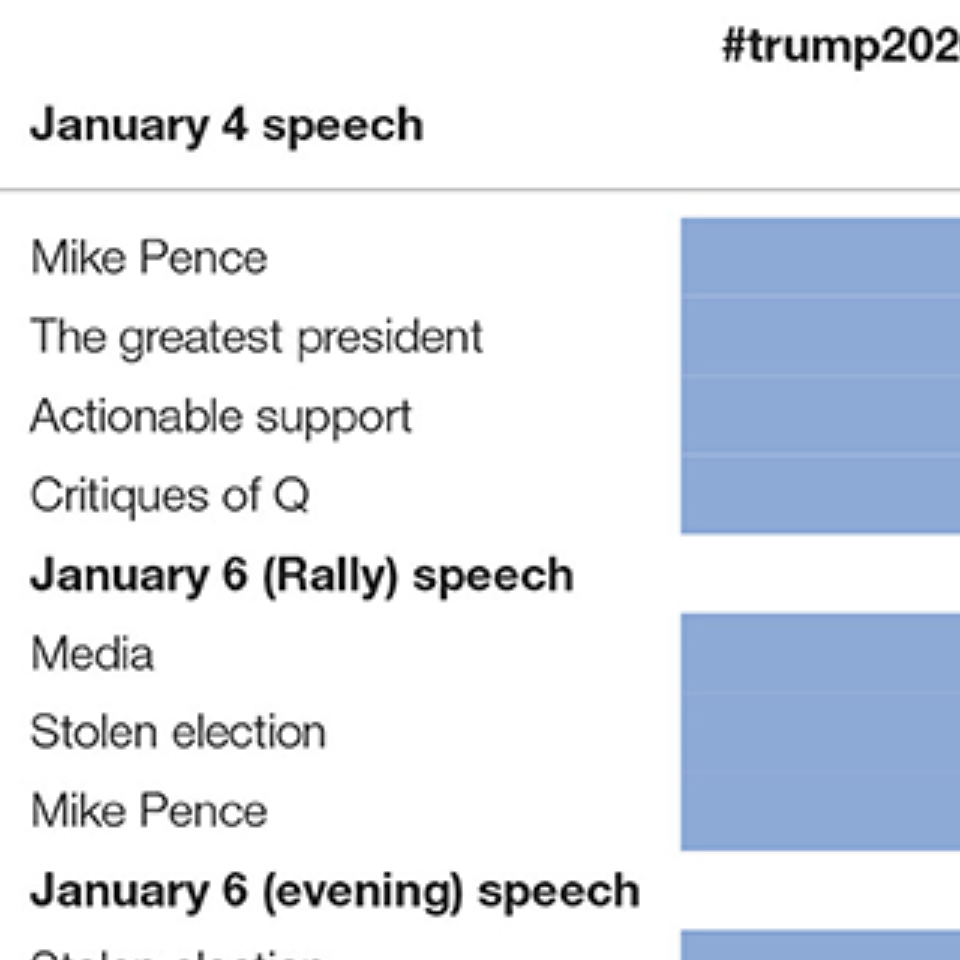
The transfer of power stemming from the 2020 presidential election occurred during an unprecedented period in United States history. Uncertainty from the COVID-19 pandemic, ongoing societal tensions, and a fragile economy increased societal polarization, exacerbated by the outgoing president’s offline rhetoric. As a result, online groups such as QAnon engaged in extra political participation beyond the traditional platforms. This research explores the link between offline political speech and online extra-representational participation by examining Twitter within the context of the January 6 insurrection. Using a mixed-methods approach of quantitative and qualitative thematic analyses, the study combines offline speech information with Twitter data during key speech addresses leading up to the date of the insurrection; exploring the link between Trump’s offline speeches and QAnon’s hashtags across a 3-day timeframe. We find that links between online extra-representational participation and offline political speech exist. This research illuminates this phenomenon and offers policy implications for the role of online messaging as a tool of political mobilization.
Claire Seungeun Lee, Juan Merizalde, John D. Colautti, Jisun An and Haewoon Kwak
Press coverage-PsyPost
computational journalism user engagement
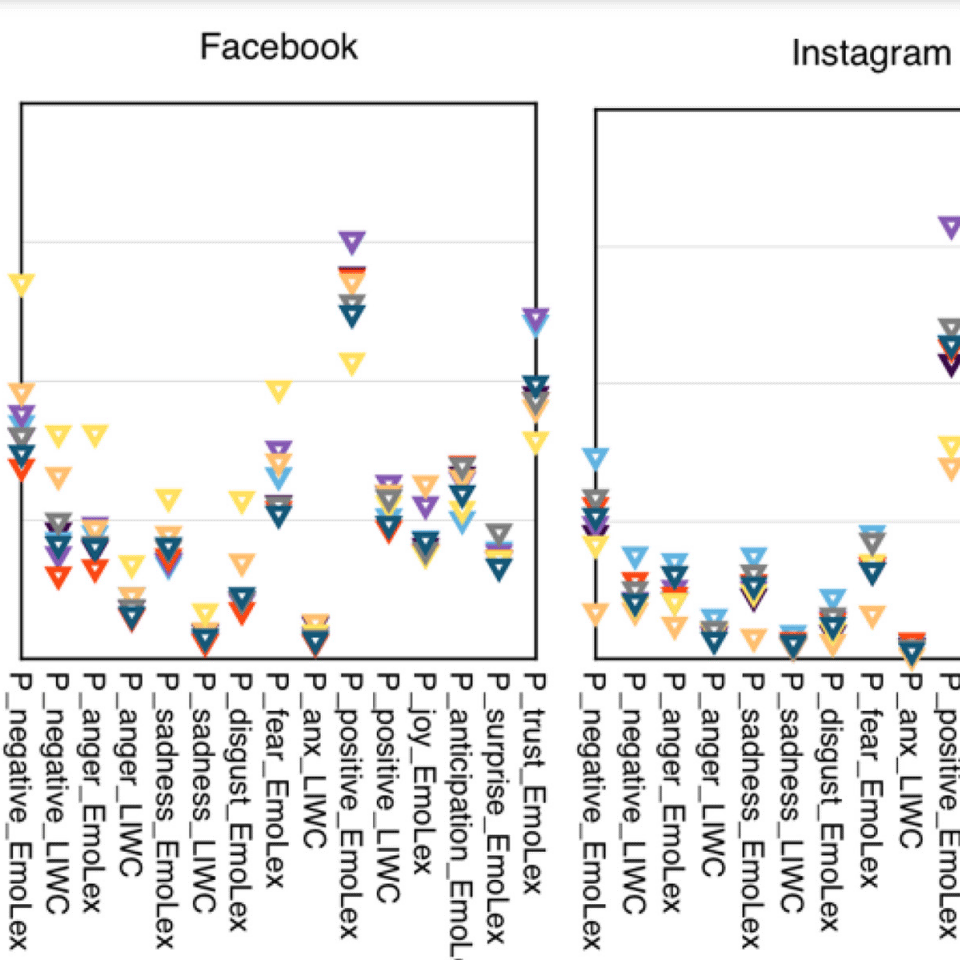
Using Plutchik’s wheel of emotions framework, we identify the emotional content of 133,487 social media posts and the audience’s emotional engagement expressed in 2,824,162 comments on those posts. We measure nine emotions (anger, anticipation, anxiety, disgust, joy, fear, sadness, surprise, trust) and two sentiments (positive and negative) using two extraction resources (EmoLex, LIWC) for eight major news outlets across four social media platforms (Facebook, Instagram, Twitter, and YouTube) during eight months. We then apply two approaches (Logistic Regression, Long Short-Term Memory) to predict emotional audience reactions before and after publishing the posts. …
Kholoud Khalil Aldous, Jisun An, Bernard J. Jansen
ACM Transactions on Social Computing, 2022
AI/ML/NLP online harm
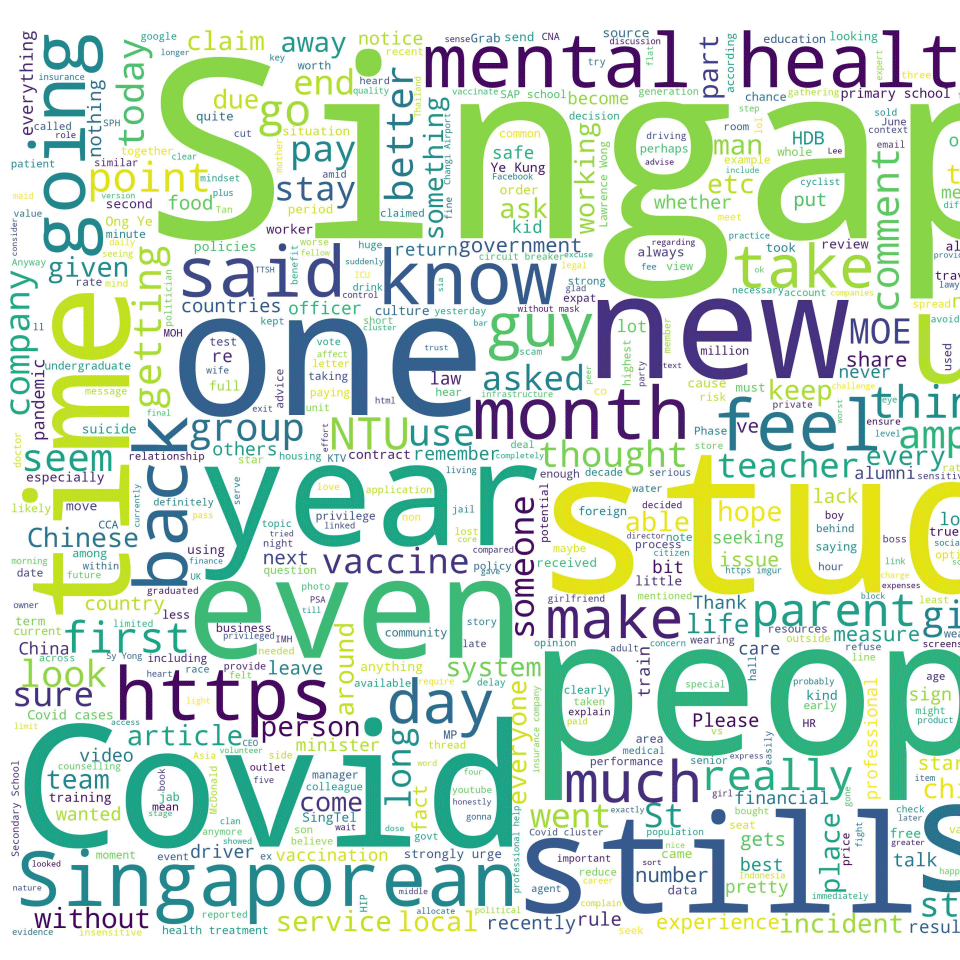
While the contagious nature of online toxicity sparked increasing interest in its early detection and prevention, most of the literature focuses on the Western world. In this work, we demonstrate that 1) it is possible to detect toxicity triggers in an Asian online community, and 2) toxicity triggers can be strikingly different between Western and Eastern contexts.
Yun Yu Chong, Haewoon Kwak
Proceedings of the 16th International AAAI Conference on Web and Social Media (ICWSM), 2022 (short)
Press coverage-AI Ethics Brief Newsletter by Montreal AI Ethics Institute
computational journalism user engagement
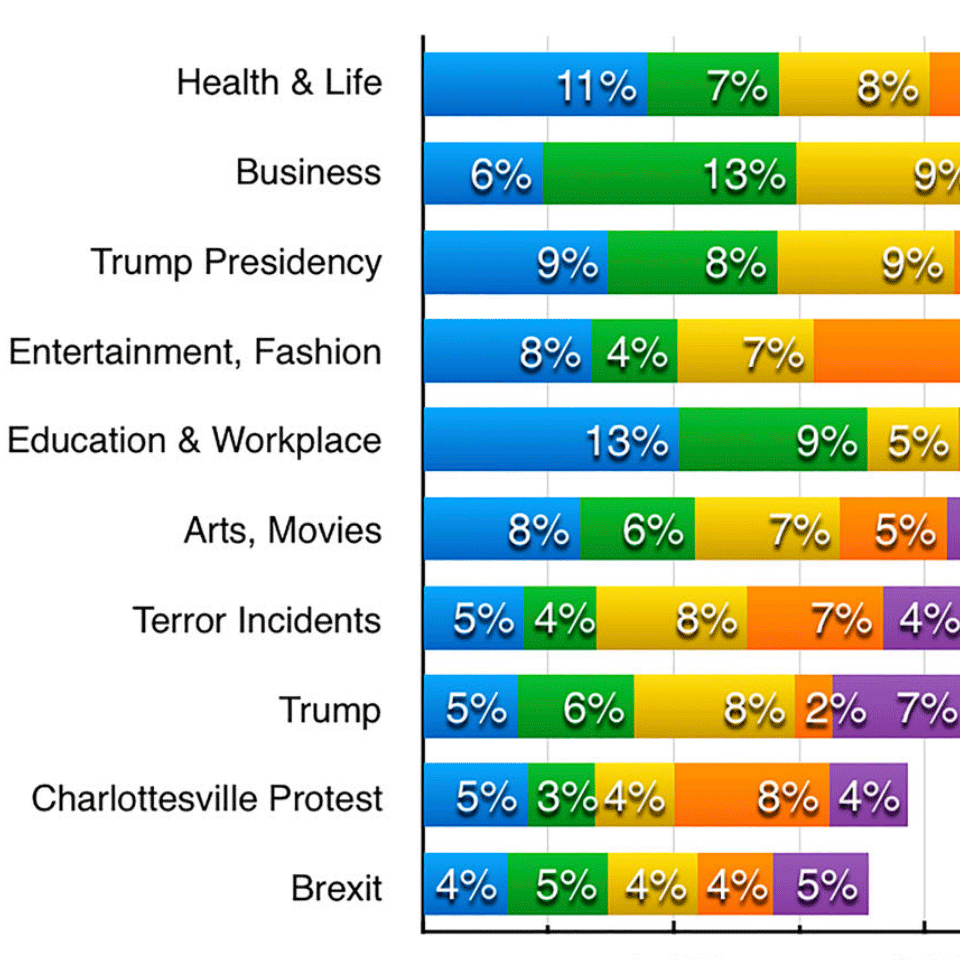
This research characterises user engagement of approximately 3,000,000 news postings of 53 news outlets and 50,000,000 associated user comments during 8 months on 5 social media platforms (i.e. Facebook, Instagram, Twitter, YouTube, and Reddit). We investigate the effect of sentiments and topics on user engagement across four levels of user engagement expressions (i.e. views, likes, comments, cross-platform posting). We find that sentiments and topics differ by both news outlets and social media platforms, and both sentiments and topics by the four levels of user engagement expression. …
Kholoud Khalil Aldous, Jisun An, Bernard J. Jansen
Behaviour & Information Technology, 2022
AI/ML/NLP online harm
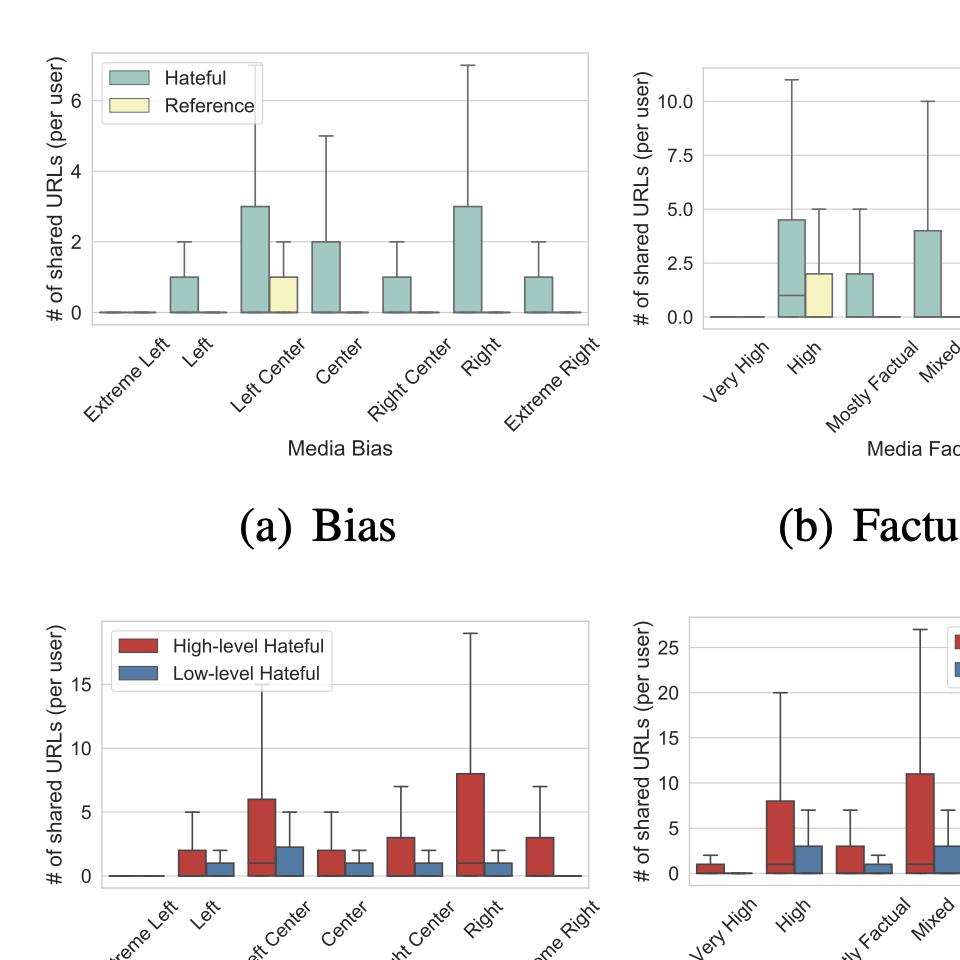
We investigate predictors of anti-Asian hate among Twitter users throughout COVID-19. With the rise of xenophobia and polarization that has accompanied widespread social media usage in many nations, online hate has become a major social issue, attracting many researchers. Here, we apply natural language processing techniques to characterize social media users who began to post anti-Asian hate messages during COVID-19. We compare two user groups – those who posted anti-Asian slurs and those who did not – with respect to a rich set of features measured with data prior to COVID-19 and show that it is possible to predict who later publicly posted anti-Asian slurs. …
Jisun An, Haewoon Kwak, Claire Seungeun Lee, Bogang Jun, Yong-Yeol Ahn
Findings of the Association for Computational Linguistics EMNLP 2021
user engagement

We propose a novel precision public health campaign framework to structure and standardize the process of designing and delivering tailored health messages to target particular population segments using social media–targeted advertising tools. Our framework consists of five stages - defining a campaign goal, priority audience, and evaluation metrics; splitting the target audience into smaller segments; tailoring the message for each segment and conducting a pilot test; running the health campaign formally; and evaluating the performance of the campaigns. We have demonstrated how the framework works through 2 case studies. The precision public health campaign framework has the potential to support higher population uptake and engagement rates by encouraging a more standardized, concise, efficient, and targeted approach to public health campaign development.
Jisun An, Haewoon Kwak, Hanya M Qureshi, Ingmar Weber
JMIR Form Res 2021;5(9):e22313, 2021
political science
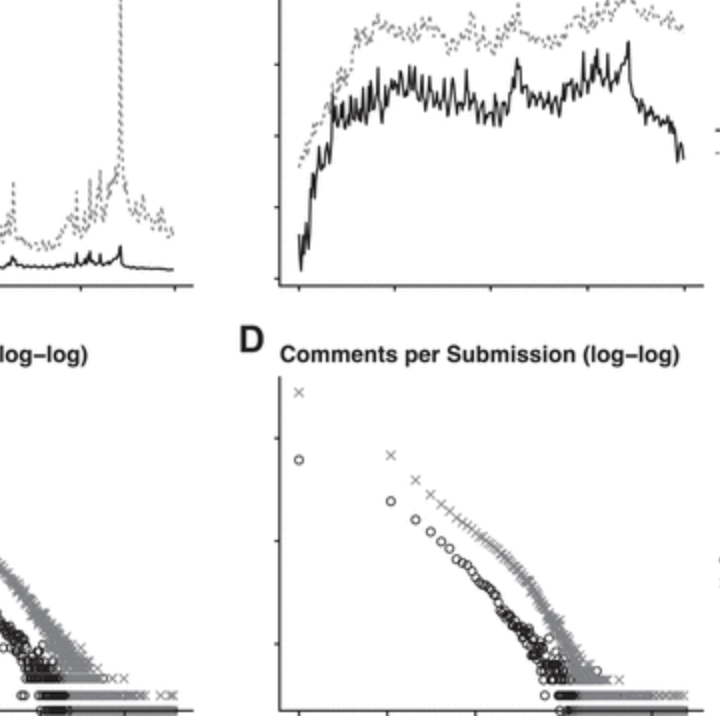
We investigate differences along these dimensions on the online forum Reddit by comparing linguistic patterns and content of comments in two subreddits focusing on a populist, Donald Trump (/r/The_Donald), and a center-left politician, Hillary Clinton (/r/hillaryclinton), during the 2016 U.S. presidential election campaign.
Andreas Jungherr, Oliver Posegga, Jisun An
Social Science Computer Review. March 2021.
computational journalism AI/ML/NLP user engagement
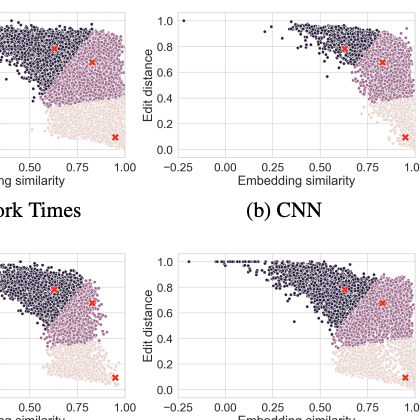
We first build a parallel corpus of original news articles and their corresponding tweets that were shared by eight media outlets. Then, we explore how those media edited tweets against original headlines, and the effects would be..
Kunwoo Park, Haewoon Kwak, Jisun An, Sanjay Chawla
Proceedings of the 15th International AAAI Conference on Web and Social Media (ICWSM), 2021
computational journalism network science bias/fairness
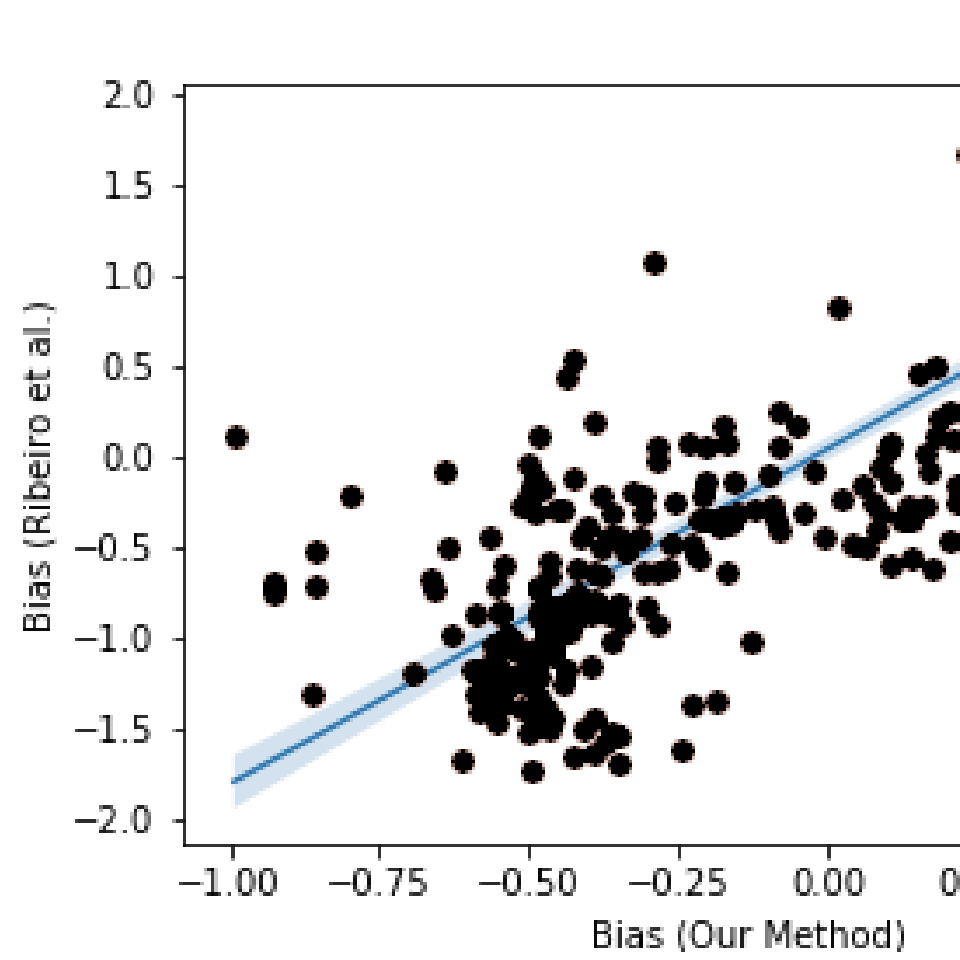
In this work, we propose a graph-based semi-supervised method to measure the political bias of pages on most countries and show the political split of the alternative media, mainstream media, and public figures pages. We validate our method using the publicly available U.S. dataset and then apply it to Brazilian pages, where we found a larger number of right-wing pages in general, except for alternative news media.
Samuel S Guimarães, Julio CS Reis, Lucas Lima, Filipe N Ribeiro, Marisa Vasconcelos, Jisun An, Haewoon Kwak, Fabrício Benevenuto
IEEE/ACM International Conference on Advances in Social Networks Analysis and Mining (ASONAM), 2020
computational journalism AI/ML/NLP bias/fairness
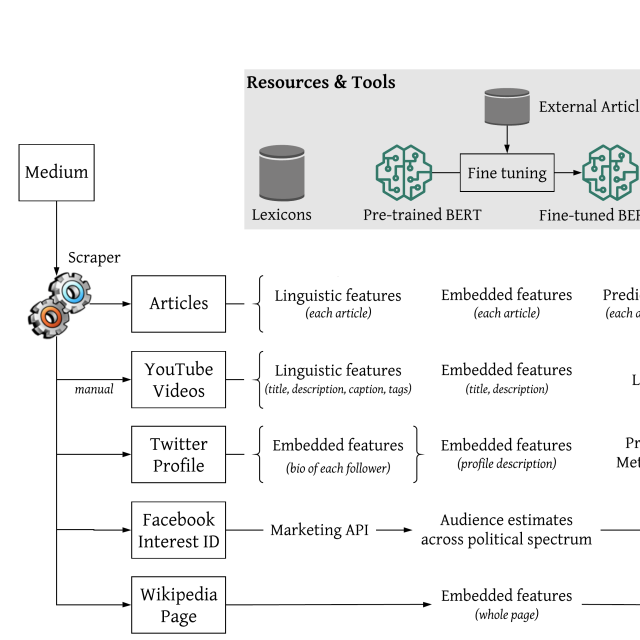
Predicting the political bias and the factuality of reporting of entire news outlets are critical elements of media profiling, which is an understudied but an increasingly important research direction. The present level of proliferation of fake, biased, and propagandistic content online has made it impossible to fact-check every single suspicious claim, either manually or automatically. Thus, it has been proposed to profile entire news outlets and to look for those that are likely to publish fake or biased content. This makes it possible to detect likely “fake news” the moment they are published, by simply checking the reliability of their source. From a practical perspective, political bias and factuality of reporting have a linguistic aspect but also a social context.
Ramy Baly, Georgi Karadzhov, Jisun An, Haewoon Kwak, Yoan Dinkov, Ahmed Ali, James Glass, Preslav Nakov
Proceedings of the 58th Annual Meeting of the Association for Computational Linguistics (ACL) (2020)
AI/ML/NLP user engagement
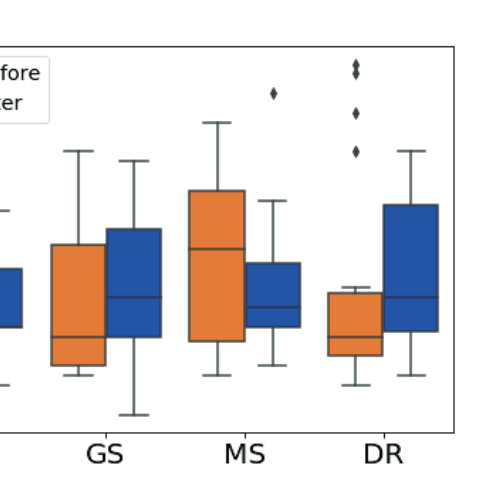
We study two Reddit communities that adopted this scheme, whereby posts include tags identifying education status referred to as flairs, and we examine how the “transferred” social status affects the interactions among the users.
Kunwoo Park, Haewoon Kwak, Hyunho Song, Meeyoung Cha
Proceedings of the 14th International AAAI Conference on Web and Social Media (ICWSM), 2020
AI/ML/NLP online harm
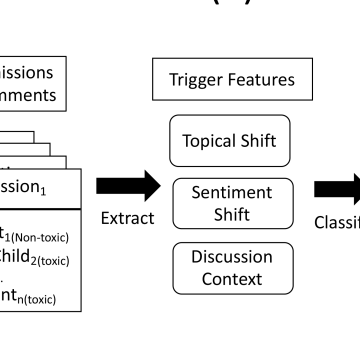
We define toxicity triggers in online discussions as a non-toxic comment that lead to toxic replies. Then, we build a neural network-based prediction model for toxicity trigger.
Hind Almerekhi, Haewoon Kwak, Bernard Jim Jansen, Joni Salminen (short)
Proceedings of The Web Conference (WWW), 2020
bias/fairness
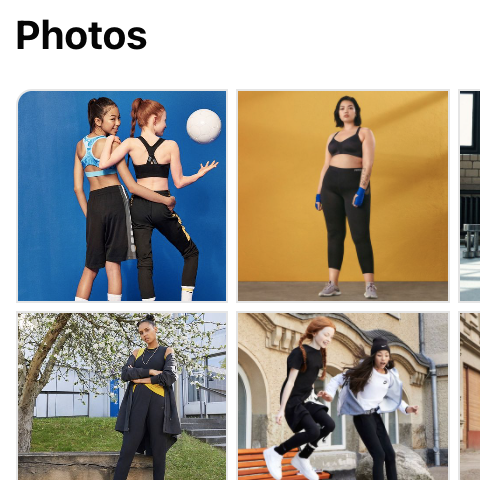
Gender and racial diversity in the mediated images from the media shape our perception of different demographic groups. In this work, we investigate gender and racial diversity of 85,957 advertising images shared by the 73 top international brands on Instagram and Facebook.
Jisun An, Haewoon Kwak
Proceedings of Social Informatics (SocInfo), 2019
Best Paper Award
political science
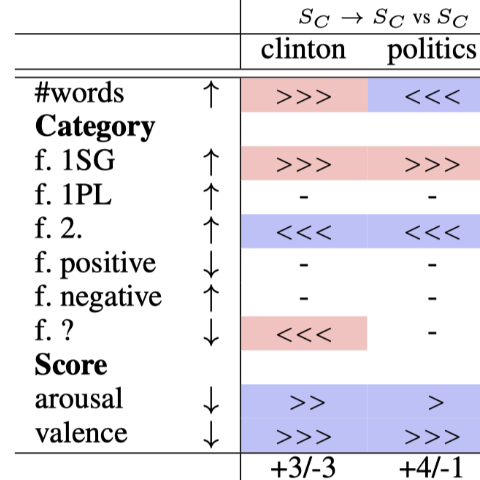
We use Reddit to explore the nature of political discussionsin homogeneous and cross-cutting communication spaces. Inparticular, we develop an analytical template to studyinter-actionandlinguistic patternswithin and between politicallyhomogeneous and heterogeneous communication spaces. Ouranalyses reveal different behavioral patterns in homogeneousand cross-cutting communications spaces.
Jisun An, Haewoon Kwak, Oliver Posegga, Andreas Jungherr
Proceedings of the 13th International AAAI Conference on Web and Social Media (ICWSM), 2019
computational journalism user engagement
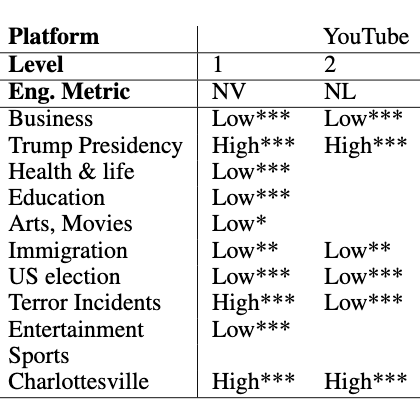
We evaluate the effects of the topics of social media posts on audiences across five social media platforms (i.e., Facebook, Instagram, Twitter, YouTube, and Reddit) at four levels of user engagement. We collected 3,163,373 social posts from 53 news organizations across five platforms during an 8month period.
Kholoud Khalil Aldous, Jisun An, Bernard J. Jansen
Proceedings of the 13th International AAAI Conference on Web and Social Media (ICWSM), 2019
computational journalism
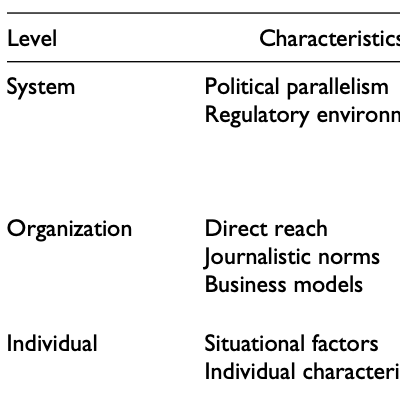
We propose the concept of discursive power. This describes the ability of contributors to communication spaces to introduce, amplify, and maintain topics, frames, and speakers, thus shaping public discourses and controversies that unfold in interconnected communication spaces.
Andreas Jungherr, Oliver Posegga, Jisun An
The International Journal of Press/Politics, 24(4), 2019
online harm
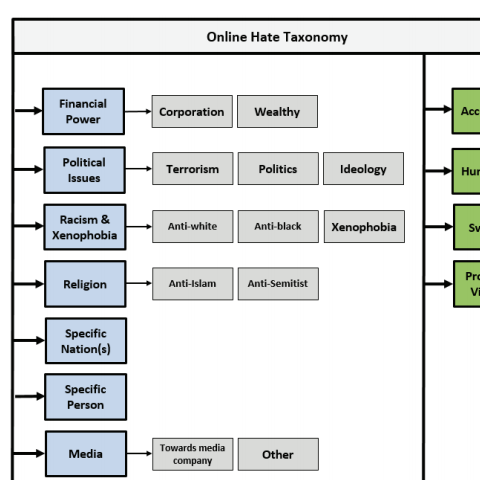
We manually label 5,143 hateful expressions posted to YouTube and Facebook videos among a dataset of 137,098 comments from an online news media. We then create a granular taxonomy of different types and targets of online hate and train machine learning models to automatically detect and classify the hateful comments in the full dataset.
Joni Salminen, Hind Almerekhi, Milica Milenković, Soon-gyo Jung, Jisun An, Haewoon Kwak, Bernard J. Jansen
Proceedings of the 12th International AAAI Conference on Web and Social Media (ICWSM), 2018
online harm
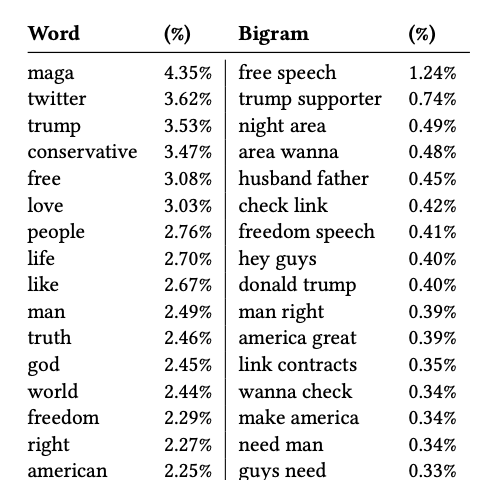
We provide, to the best of our knowledge, the first characterization of Gab. We collect and analyze 22M posts produced by 336K users between August 2016 and January 2018, finding that Gab is predominantly used for the dissemination and discussion of news and world events, and that it attracts alt-right users, conspiracy theorists, and other trolls
Savvas Zannettou, Barry Bradlyn, Emiliano De Cristofaro, Haewoon Kwak, Michael Sirivianos, Gianluca Stringhini, Jeremy Blackburn
Companion Proceedings of the The Web Conference (WWW), 2018
Press coverage-New Scientist, and Vice
computational journalism user engagement
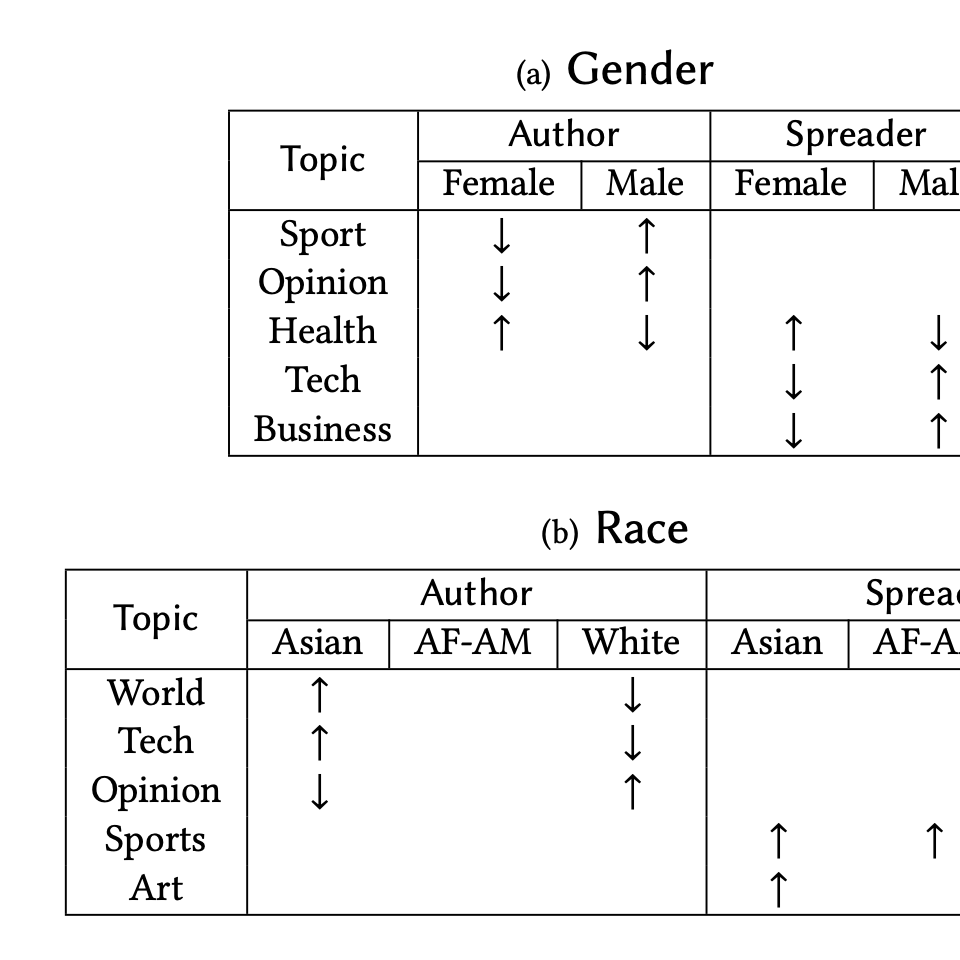
The widespread adoption and dissemination of online news through social media systems have been revolutionizing many segments of our society and ultimately our daily lives. In these systems, users can play a central role as they share content to their friends. Despite that, little is known about news spreaders in social media. In this paper, we provide the first of its kind in-depth characterization of news spreaders in social media. In particular, we investigate their demographics, what kind of content they share, and the audience they reach.
Julio Reis, Haewoon Kwak, and Jisun An, Johnnatan Messias, Fabrıcio Benevenuto
Proceedings of the 28th ACM Conference on Hypertext and Social Media (HT), 2017
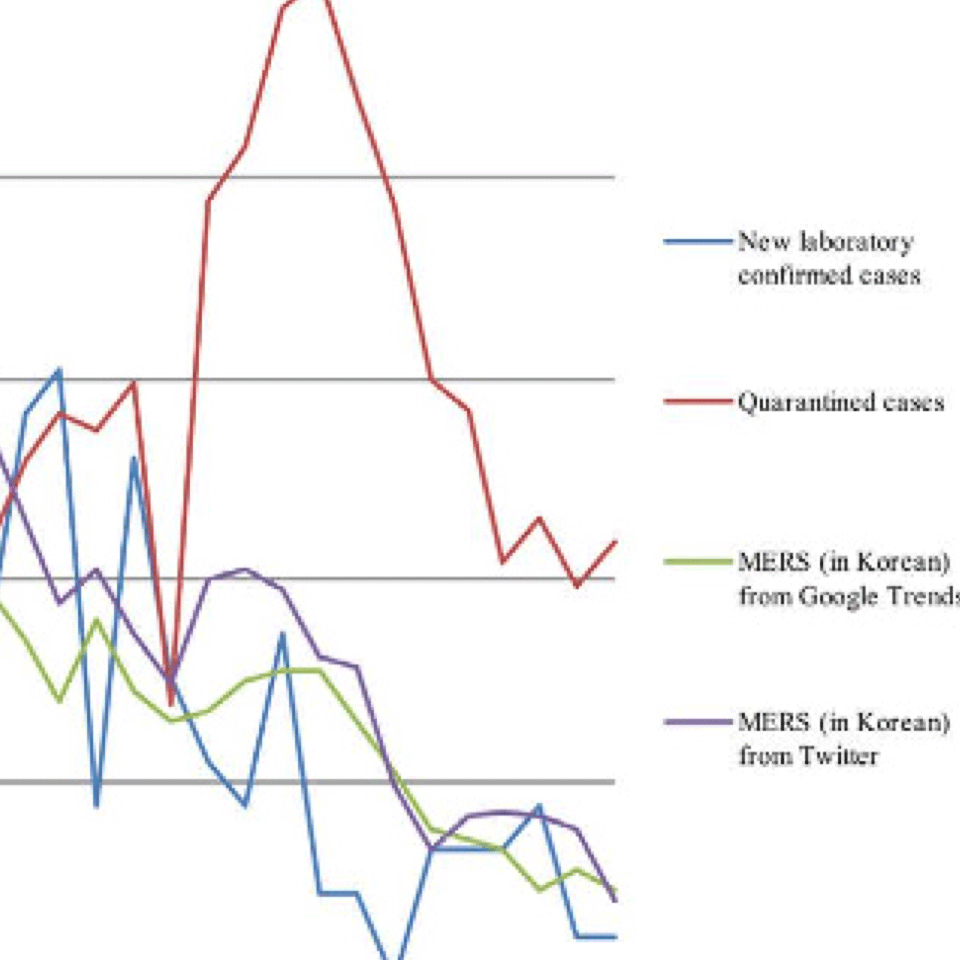
The Middle East respiratory syndrome coronavirus (MERS-CoV) was exported to Korea in 2015, resulting in a threat to neighboring nations. We evaluated the possibility of using a digital surveillance system based on web searches and social media data to monitor this MERS outbreak. We collected the number of daily laboratory-confirmed MERS cases and quarantined cases from May 11, 2015 to June 26, 2015 using the Korean government MERS portal. The daily trends observed via Google search and Twitter during the same time period were also ascertained using Google Trends and Topsy. Correlations among the data were then examined using Spearman correlation analysis.
Soo-Yong Shin, Dong-Woo Seo, Jisun An, Haewoon Kwak, Sung-Han Kim, Jin Gwack, Min-Woo Jo
Scientific Reports 6, Article number 32920 (2016)
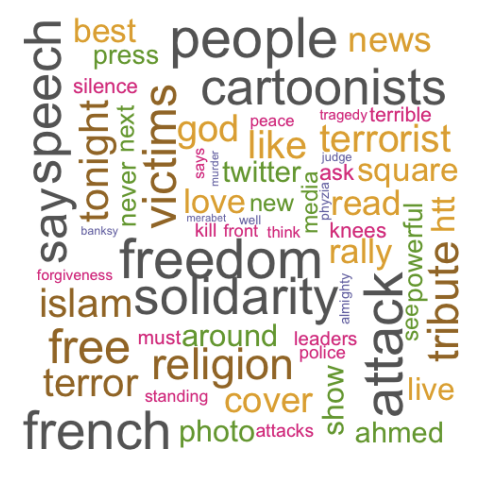
We study the response to the Charlie Hebdo shootings of January 7, 2015 on Twitter across the globe. We ask whether the stances on the issue of freedom of speech can be modeled using established sociological theories, including Huntington’s culturalist Clash of Civilizations, and those taking into consideration social context, including Density and Interdependence theories. We find support for Huntington’s culturalist explanation, in that the established traditions and norms of one’s “civilization” predetermine some of one’s opinion.
Jisun An, Haewoon Kwak, Yelena Mejova, Sonia Alonso Saenz De Oger, Braulio Gomez Fortes
Proceeding of the 10th International Conference on Web and Social Media (ICWSM), 2016
network science HCI
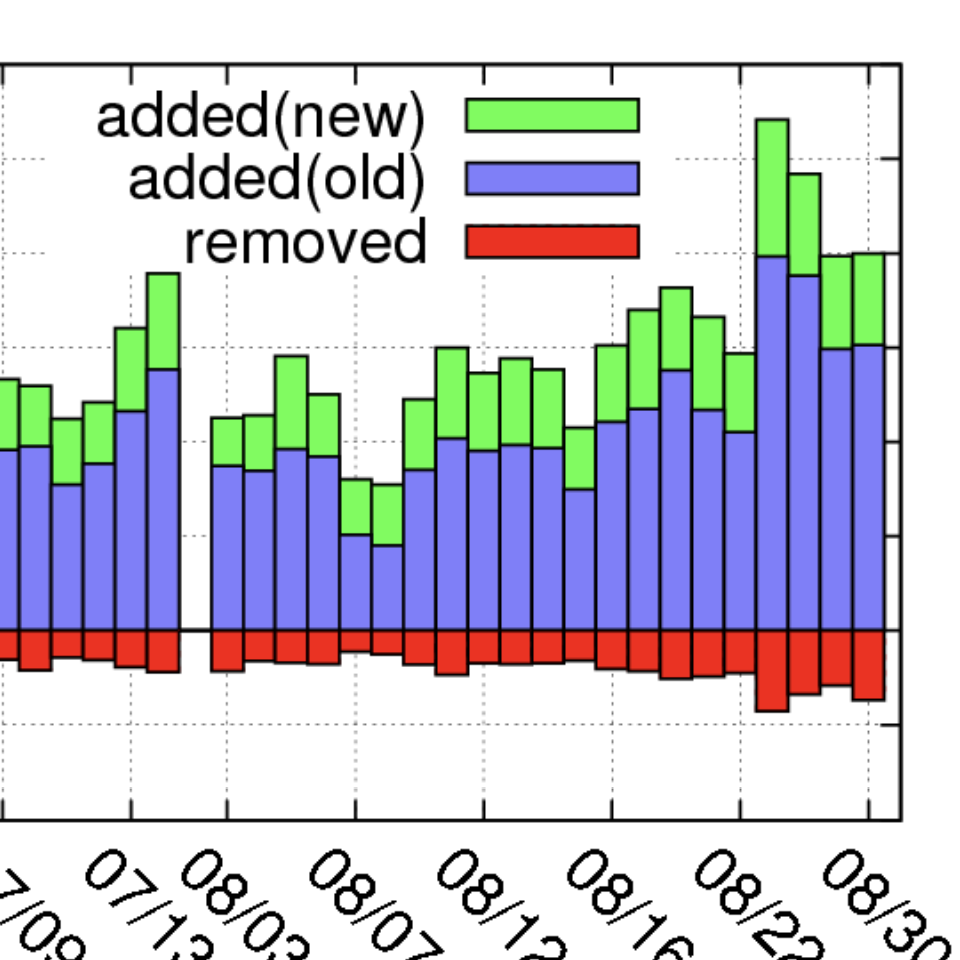
We analyze the dynamics of the behavior known as ‘unfollow’ in Twitter. We collected daily snapshots of the online relationships of 1.2 million Korean-speaking users for 51 days as well as all of their tweets. We found that Twitter users frequently unfollow. We then discover the major factors, including the reciprocity of the relationships, the duration of a relationship, the followees’ informativeness, and the overlap of the relationships, which affect the decision to unfollow. We conduct interview with 22 Korean respondents to supplement the quantitative results.
Haewoon Kwak, Hyunwoo Chun, Sue Moon
Proceedings of the SIGCHI Conference on Human Factors in Computing Systems (CHI), 2011.
Press coverage - Kyunghyang Shinmun
computational journalism network science
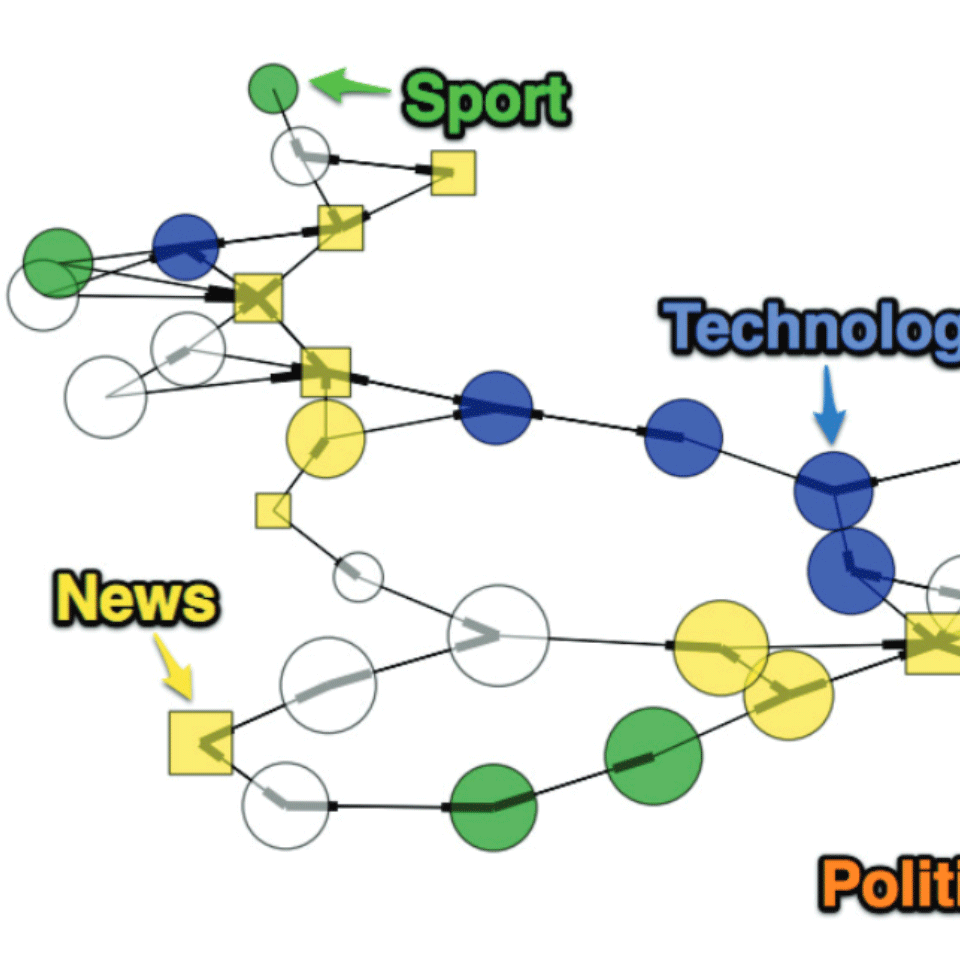
We present a preliminary but groundbreaking study of the media landscape of Twitter. We use public data on whom follows who to uncover common behaviour in media consumption, the relationship between various classes of media, and the diversity of media content which social links may bring. Our analysis shows that there is a non-negligible amount of indirect media exposure, either through friends who follow particular media sources, or via retweeted messages. We show that the indirect media exposure expands the political diversity of news to which users are exposed to a surprising extent, increasing the range by between 60-98%. These results are valuable because they have not been readily available to traditional media, and they can help predict how we will read news, and how publishers will interact with us in the future.
Jisun An, Meeyoung Cha, Krishna Gummadi, Jon Crowcroft
Proceedings of the 5th International AAAI Conference on Weblogs and Social Media (ICWSM), 2011.
network science
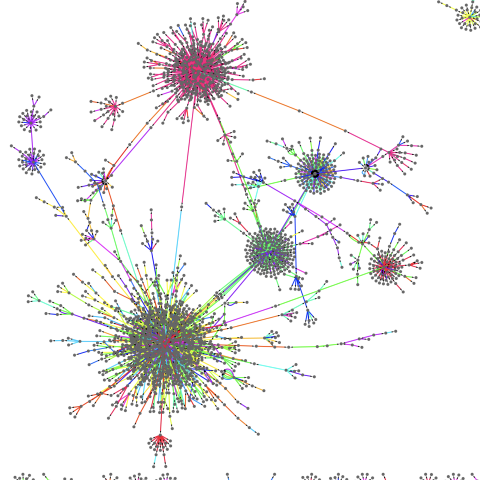
We have crawled the entire Twitter site and obtained 41.7 million user profiles, 1.47 billion social relations, 4,262 trending topics, and 106 million tweets. In its follower-following topology analysis we have found a non-power-law follower distribution, a short effective diameter, and low reciprocity, which all mark a deviation from known characteristics of human social networks [28]. In order to identify influentials on Twitter, we have ranked users by the number of followers and by PageRank and found two rankings to be similar. Ranking by retweets differs from the previous two rankings, indicating a gap in influence inferred from the number of followers and that from the popularity of one’s tweets.
Haewoon Kwak, Changhyun Lee, Hosung Park, Sue Moon
Proceedings of the 19th international conference on World wide web (WWW), 2010.
Press coverage - Mashable Op-Ed, ReadWrite, The Guardian, PC News, Chosun Ilbo, DongA Ilbo
Full List
The Impact of Toxic Trolling Comments on Anti-vaccine YouTube Videos
Kunihiro Miyazaki, Takayuki Uchiba, Haewoon Kwak, Jisun An, Kazutoshi Sasahara
Scientific Reports, 2024
Public Perception of Generative AI on Twitter: An Empirical Study Based on Occupation and Usage
Kunihiro Miyazaki, Taichi Murayama, Takayuki Uchiba, Jisun An, Haewoon Kwak
EPJ Data Science, 2024
Press coverage-Blockchain News
35+ papers citing this work (Google scholar)
Wearing Masks Implies Refuting Trump?: Towards Target-specific User Stance Prediction across Events in COVID-19 and US Election 2020
Hong Zhang, Haewoon Kwak, Wei Gao, Jisun An
ACM WebSci, 2023
5+ papers citing this work (Google scholar)
Political Honeymoon Effect on Social Media: Characterizing Social Media Reaction to the Changes of Prime Minister in Japan
Kunihiro Miyazaki, Taichi Murayama, Akira Matsui, Masaru Nishikawa, Takayuki Uchiba, Haewoon Kwak, Jisun An
ACM WebSci, 2023
5+ papers citing this work (Google scholar)
YouNICon: YouTube’s CommuNIty of Conspiracy Videos
Shaoyi Liaw, Fan Huang, Fabricio Benevenuto, Haewoon Kwak, Jisun An
ICWSM Dataset, 2023
5+ papers citing this work (Google scholar)
‘This is Fake News’: Characterizing the Spontaneous Debunking from Twitter Users to COVID-19 False Information
Kunihiro Miyazaki, Takayuki Uchiba, Kenji Tanaka, Jisun An, Haewoon Kwak, Kazutoshi Sasahara
AAAI ICWSM, 2023
10+ papers citing this work (Google scholar)
MAANG? MANGA? Characterizing Spontaneous Ideation Contest on Social Media
Kunihiro Miyazaki, Takayuki Uchiba, Haewoon Kwak, Jisun An
IEEE BigData, 2022 (short)
Modeling Political Activism around Gun Debate via Social Media
Yelena Mejova, Jisun An, Gianmarco De Francisci Morales, Haewoon Kwak
ACM Transactions on Social Computing, 2022
5+ papers citing this work (Google scholar)
Storm the Capitol: Linking Offline Political Speech and Online Twitter Extra-Representational Participation on QAnon and the January 6 Insurrection
Claire Seungeun Lee, Juan Merizalde, John D. Colautti, Jisun An and Haewoon Kwak
Frontiers in Sociology, 2022
Press coverage-PsyPost
35+ papers citing this work (Google scholar)
Measuring 9 Emotions of News Posts from 8 News Organizations across 4 Social Media Platforms for 8 Months
Kholoud Khalil Aldous, Jisun An, Bernard J. Jansen
ACM Transactions on Social Computing, 2022
10+ papers citing this work (Google scholar)
Understanding Toxicity Triggers on Reddit in the Context of Singapore
Yun Yu Chong, Haewoon Kwak
Proceedings of the 16th International AAAI Conference on Web and Social Media (ICWSM), 2022 (short)
Press coverage-AI Ethics Brief Newsletter by Montreal AI Ethics Institute
20+ papers citing this work (Google scholar)
What really matters?: characterising and predicting user engagement of news postings using multiple platforms, sentiments and topics
Kholoud Khalil Aldous, Jisun An, Bernard J. Jansen
Behaviour & Information Technology, 2022
10+ papers citing this work (Google scholar)
Predicting Anti-Asian Hateful Users on Twitter during COVID-19
Jisun An, Haewoon Kwak, Claire Seungeun Lee, Bogang Jun, Yong-Yeol Ahn
Findings of the Association for Computational Linguistics EMNLP 2021
Code repo (github)
30+ papers citing this work (Google scholar)
Precision Public Health Campaign: Delivering Persuasive Messages to Relevant Segments Through Targeted Advertisements on Social Media
Jisun An, Haewoon Kwak, Hanya M Qureshi, Ingmar Weber
JMIR Form Res 2021;5(9):e22313, 2021
25+ papers citing this work (Google scholar)
Populist Supporters on Reddit: A Comparison of Content and Behavioral Patterns Within Publics of Supporters of Donald Trump and Hillary Clinton
Andreas Jungherr, Oliver Posegga, Jisun An
Social Science Computer Review. March 2021.
15+ papers citing this work (Google scholar)
How-to Present News on Social Media: A Causal Analysis of Editing News Headlines for Boosting User Engagement
Kunwoo Park, Haewoon Kwak, Jisun An, Sanjay Chawla
Proceedings of the 15th International AAAI Conference on Web and Social Media (ICWSM), 2021
15+ papers citing this work (Google scholar)
Identifying and Characterizing Alternative News Media on Facebook
Samuel S Guimarães, Julio CS Reis, Lucas Lima, Filipe N Ribeiro, Marisa Vasconcelos, Jisun An, Haewoon Kwak, Fabrício Benevenuto
IEEE/ACM International Conference on Advances in Social Networks Analysis and Mining (ASONAM), 2020
What Was Written vs. Who Read It: News Media Profiling Using Text Analysis and Social Media Context
Ramy Baly, Georgi Karadzhov, Jisun An, Haewoon Kwak, Yoan Dinkov, Ahmed Ali, James Glass, Preslav Nakov
Proceedings of the 58th Annual Meeting of the Association for Computational Linguistics (ACL) (2020)
55+ papers citing this work (Google scholar)
“Trust Me, I Have a Ph.D.”: A Propensity Score Analysis on the Halo Effect of Disclosing One’s Offline Social Status in Online Communities
Kunwoo Park, Haewoon Kwak, Hyunho Song, Meeyoung Cha
Proceedings of the 14th International AAAI Conference on Web and Social Media (ICWSM), 2020
15+ papers citing this work (Google scholar)
Are These Comments Triggering? Predicting Triggers of Toxicity in Online Discussions
Hind Almerekhi, Haewoon Kwak, Bernard Jim Jansen, Joni Salminen (short)
Proceedings of The Web Conference (WWW), 2020
50+ papers citing this work (Google scholar)
Gender and Racial Diversity in Commercial Brands’ Advertising Images on Social Media
Jisun An, Haewoon Kwak
Proceedings of Social Informatics (SocInfo), 2019
Best Paper Award
20+ papers citing this work (Google scholar)
Detecting Toxicity Triggers in Online Discussions
Hind Almerekhi, Haewoon Kwak, Bernard Jim Jansen, Joni Salminen (poster)
Proceedings of the 30th ACM Conference on Hypertext and Social Media (HT), 2019
40+ papers citing this work (Google scholar)
Political Discussions in Homogeneous and Cross-Cutting Communication Spaces
Jisun An, Haewoon Kwak, Oliver Posegga, Andreas Jungherr
Proceedings of the 13th International AAAI Conference on Web and Social Media (ICWSM), 2019
65+ papers citing this work (Google scholar)
View, Like, Comment, Post: Analyzing User Engagement by Topic at 4 Levels across 5 Social Media Platforms for 53 News Organizations
Kholoud Khalil Aldous, Jisun An, Bernard J. Jansen
Proceedings of the 13th International AAAI Conference on Web and Social Media (ICWSM), 2019
85+ papers citing this work (Google scholar)
Discursive Power in Contemporary Media Systems: A Comparative Framework
Andreas Jungherr, Oliver Posegga, Jisun An
The International Journal of Press/Politics, 24(4), 2019
130+ papers citing this work (Google scholar)
Anatomy of Online Hate: Developing a Taxonomy and Machine Learning Models for Identifying and Classifying Hate in Online News Media
Joni Salminen, Hind Almerekhi, Milica Milenković, Soon-gyo Jung, Jisun An, Haewoon Kwak, Bernard J. Jansen
Proceedings of the 12th International AAAI Conference on Web and Social Media (ICWSM), 2018
140+ papers citing this work (Google scholar)
What is Gab? A Bastion of Free Speech or an Alt-Right Echo Chamber?
Savvas Zannettou, Barry Bradlyn, Emiliano De Cristofaro, Haewoon Kwak, Michael Sirivianos, Gianluca Stringhini, Jeremy Blackburn
Companion Proceedings of the The Web Conference (WWW), 2018
Press coverage-New Scientist, and Vice
280+ papers citing this work (Google scholar)
Demographics of News Sharing in the US Twittersphere
Julio Reis, Haewoon Kwak, and Jisun An, Johnnatan Messias, Fabrıcio Benevenuto
Proceedings of the 28th ACM Conference on Hypertext and Social Media (HT), 2017
35+ papers citing this work (Google scholar)
High correlation of Middle East respiratory syndrome spread with Google search and Twitter trends in Korea
Soo-Yong Shin, Dong-Woo Seo, Jisun An, Haewoon Kwak, Sung-Han Kim, Jin Gwack, Min-Woo Jo
Scientific Reports 6, Article number 32920 (2016)
130+ papers citing this work (Google scholar)
Are You Charlie or Ahmed? Cultural Pluralism in Charlie Hebdo Response on Twitter
Jisun An, Haewoon Kwak, Yelena Mejova, Sonia Alonso Saenz De Oger, Braulio Gomez Fortes
Proceeding of the 10th International Conference on Web and Social Media (ICWSM), 2016
45+ papers citing this work (Google scholar)
#greysanatomy vs. #yankees: Demographics and Hashtag Use on Twitter.
Jisun An, Ingmar Weber (short)
Proceeding of the 10th International Conference on Web and Social Media (ICWSM), 2016
Whom should we sense in ‘social sensing’-analyzing which users work best for social media now-casting
Jisun An, Ingmar Weber
EPJ Data Science, 4, Article number 22, 2015
Breaking the News: First Impressions Matter on Online News
Julio Reis, Fabrıcio Benevenuto, Pedro Olmo, Raquel Prates, Haewoon Kwak, Jisun An
Proceeding of the 9th International Conference on Web and Social Media (ICWSM), 2015
Picked as Other Interesting arXiv Papers (Week ending April 11, 2015) in MIT Technology Review, and O Globo
200+ papers citing this work (Google scholar)
Sharing political news: the balancing act of intimacy and socialization in selective exposure
Jisun An, Daniele Quercia, Meeyoung Cha, Krishna Gummadi, Jon Crowcroft
EPJ Data Science volume 3, Article number 12, 2014
Partisan Sharing: Facebook Evidence and Societal Consequences
Jisun An, Daniele Quercia, Jon Crowcroft
Proceedings of the Second ACM Conference on Online Social Networks (COSN), 2014
110+ papers citing this work (Google scholar)
Traditional Media Seen from Social Media
Jisun An, Daniele Quercia, Meeyoung Cha, Krishna Gummadi, Jon Crowcroft
Proceedings of the 5th Annual ACM Web Science Conference (WebSci), 2013
Fragmented Social Media: A Look into Selective Exposure to Political News
Jisun An, Daniele Quercia, Jon Crowcroft (poster)
Proceedings of the 22nd International Conference on World Wide Web (WWW) Companion, 2013
Visualizing Media Bias through Twitter
Jisun An, Meeyoung Cha, Krishna Gummadi, Jon Crowcroft, Daniele Quercia
ICWSM Workshop on the Potential of Social Media Tools and Data for Journalists, 2012
Fragile Online Relationship: a First Look at Unfollow Dynamics in Twitter
Haewoon Kwak, Hyunwoo Chun, Sue Moon
Proceedings of the SIGCHI Conference on Human Factors in Computing Systems (CHI), 2011.
Press coverage - Kyunghyang Shinmun
150+ papers citing this work (Google scholar)
Media Landscape in Twitter: A World of New Conventions and Political Diversity
Jisun An, Meeyoung Cha, Krishna Gummadi, Jon Crowcroft
Proceedings of the 5th International AAAI Conference on Weblogs and Social Media (ICWSM), 2011.
200+ papers citing this work (Google scholar)
What is Twitter, a Social Network or a News Media?
Haewoon Kwak, Changhyun Lee, Hosung Park, Sue Moon
Proceedings of the 19th international conference on World wide web (WWW), 2010.
Press coverage - Mashable Op-Ed, ReadWrite, The Guardian, PC News, Chosun Ilbo, DongA Ilbo
10k+ papers citing this work (Google scholar)
Finding Influentials based on the Temporal Order of Information Adoption in Twitter
Changhyun Lee, Haewoon Kwak, Hosung Park, Sue Moon (poster)
Proceedings of the 19th international conference on World wide web (WWW), 2010.
200+ papers citing this work (Google scholar)
I Tube, You Tube, Everybody Tubes: Analyzing the World’s Largest User Generated Content Video System
Meeyoung Cha, Haewoon Kwak, Pablo Rodriguez, Yong-Yeol Ahn, Sue Moon
Proceedings of the 7th ACM SIGCOMM conference on Internet measurement (IMC), 2009
Best paper award, The IMC Test of Time Award
2,200+ papers citing this work (Google scholar)